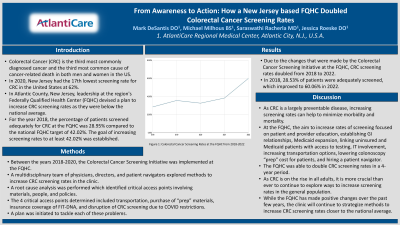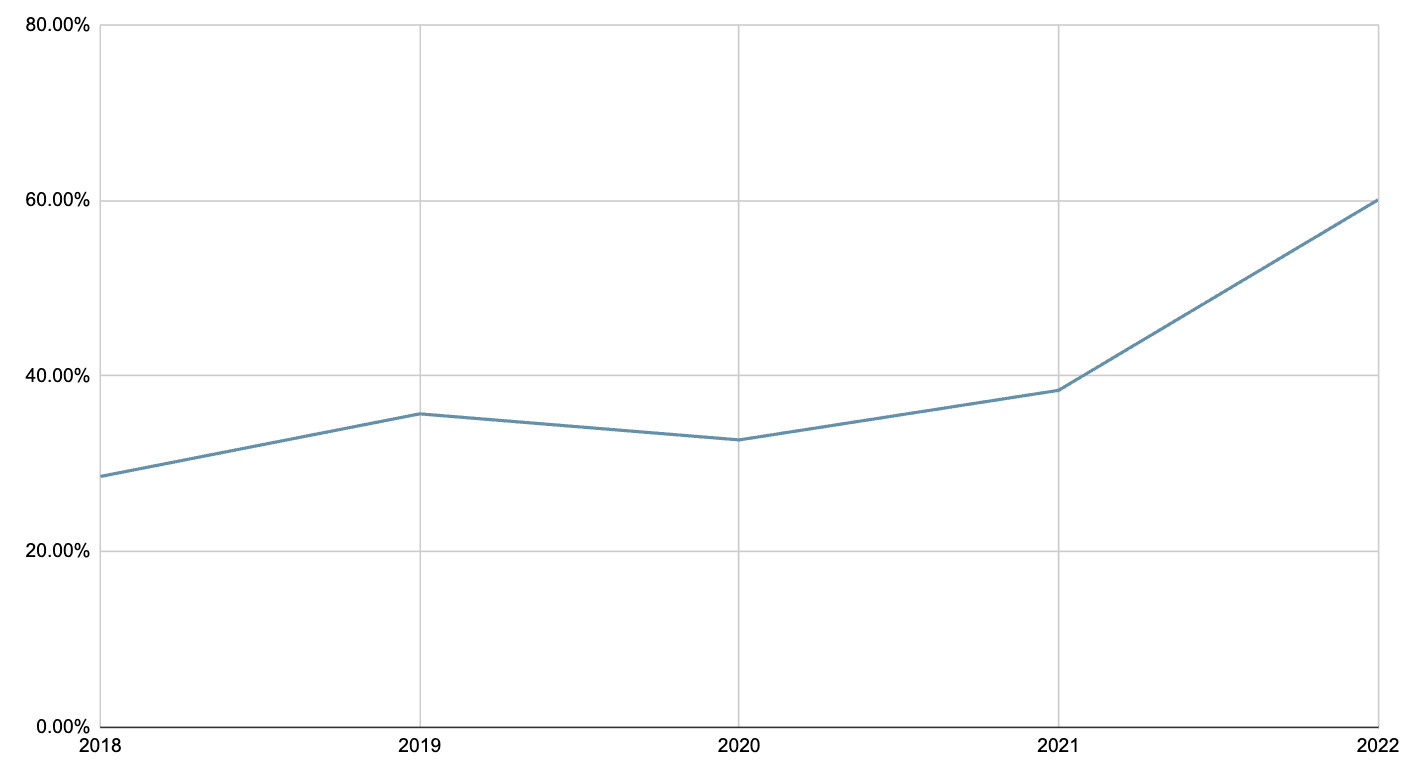Monday Poster Session
Category: Colorectal Cancer Prevention
P2126 - From Awareness to Action: How a New Jersey based FQHC Doubled Colorectal Cancer Screening Rates
Monday, October 28, 2024
10:30 AM - 4:00 PM ET
Location: Exhibit Hall E

Has Audio

Mark DeSantis, DO, MS
AtlantiCare Regional Medical Center
Brigantine, NJ
Presenting Author(s)
Mark DeSantis, DO, MS, Michael Milhous, BS, Saraswathi Racherla, MD, Jessica Roeske, DO
AtlantiCare Regional Medical Center, Atlantic City, NJ
Introduction:
Colorectal Cancer (CRC) is the third most commonly diagnosed cancer and the third most common cause of cancer-related death in both men and women in the US. In 2020, New Jersey had the 17th lowest screening rate for CRC in the United States at 62%. In Atlantic County, New Jersey, leadership at the region's Federally Qualified Health Center (FQHC) devised a plan to increase CRC screening rates as they were below the national average. For the year 2018, the percentage of patients screened adequately for CRC at the FQHC was 28.95% compared to the national FQHC target of 42.02%. The goal of increasing screening rates to at least 42.02% was established.
Methods:
Between the years 2018-2020, the Colorectal Cancer Screening Initiative was implemented at the FQHC. A multidisciplinary team of physicians, directors, and patient navigators explored methods to increase CRC screening rates in the clinic. A root cause analysis was performed which identified critical access points involving materials, people, and policies. The 4 critical access points determined included transportation, purchase of “prep” materials, insurance coverage of FIT-DNA, and disruption of CRC screening due to COVID restrictions. A plan was initiated to tackle each of these problems.
Results:
Due to the changes that were made by the Colorectal Cancer Screening Initiative at the FQHC, CRC screening rates doubled from 2018 to 2022. In 2018, 28.53% of patients were adequately screened, which improved to 60.06% in 2022.
Discussion:
As CRC is a largely preventable disease, increasing screening rates can help to minimize morbidity and mortality. At the FQHC, the aim to increase rates of screening focused on patient and provider education, establishing GI relationships, Medicaid expansion, linking uninsured and Medicaid patients with access to testing, IT involvement, increasing transportation options, lowering colonoscopy “prep” cost for patients, and hiring a patient navigator. The FQHC was able to double CRC screening rates in a 4 year period.
As CRC is on the rise in all adults, it is more crucial than ever to continue to explore ways to increase screening rates in the general population. While the FQHC has made positive changes over the past few years, the clinic will continue to strategize methods to increase CRC screening rates closer to the national average.

Disclosures:
Mark DeSantis, DO, MS, Michael Milhous, BS, Saraswathi Racherla, MD, Jessica Roeske, DO. P2126 - From Awareness to Action: How a New Jersey based FQHC Doubled Colorectal Cancer Screening Rates, ACG 2024 Annual Scientific Meeting Abstracts. Philadelphia, PA: American College of Gastroenterology.
AtlantiCare Regional Medical Center, Atlantic City, NJ
Introduction:
Colorectal Cancer (CRC) is the third most commonly diagnosed cancer and the third most common cause of cancer-related death in both men and women in the US. In 2020, New Jersey had the 17th lowest screening rate for CRC in the United States at 62%. In Atlantic County, New Jersey, leadership at the region's Federally Qualified Health Center (FQHC) devised a plan to increase CRC screening rates as they were below the national average. For the year 2018, the percentage of patients screened adequately for CRC at the FQHC was 28.95% compared to the national FQHC target of 42.02%. The goal of increasing screening rates to at least 42.02% was established.
Methods:
Between the years 2018-2020, the Colorectal Cancer Screening Initiative was implemented at the FQHC. A multidisciplinary team of physicians, directors, and patient navigators explored methods to increase CRC screening rates in the clinic. A root cause analysis was performed which identified critical access points involving materials, people, and policies. The 4 critical access points determined included transportation, purchase of “prep” materials, insurance coverage of FIT-DNA, and disruption of CRC screening due to COVID restrictions. A plan was initiated to tackle each of these problems.
Results:
Due to the changes that were made by the Colorectal Cancer Screening Initiative at the FQHC, CRC screening rates doubled from 2018 to 2022. In 2018, 28.53% of patients were adequately screened, which improved to 60.06% in 2022.
Discussion:
As CRC is a largely preventable disease, increasing screening rates can help to minimize morbidity and mortality. At the FQHC, the aim to increase rates of screening focused on patient and provider education, establishing GI relationships, Medicaid expansion, linking uninsured and Medicaid patients with access to testing, IT involvement, increasing transportation options, lowering colonoscopy “prep” cost for patients, and hiring a patient navigator. The FQHC was able to double CRC screening rates in a 4 year period.
As CRC is on the rise in all adults, it is more crucial than ever to continue to explore ways to increase screening rates in the general population. While the FQHC has made positive changes over the past few years, the clinic will continue to strategize methods to increase CRC screening rates closer to the national average.

Figure: Figure 1: Colorectal Cancer Screening Rates at the FQHC from 2018-2022
Disclosures:
Mark DeSantis indicated no relevant financial relationships.
Michael Milhous indicated no relevant financial relationships.
Saraswathi Racherla indicated no relevant financial relationships.
Jessica Roeske indicated no relevant financial relationships.
Mark DeSantis, DO, MS, Michael Milhous, BS, Saraswathi Racherla, MD, Jessica Roeske, DO. P2126 - From Awareness to Action: How a New Jersey based FQHC Doubled Colorectal Cancer Screening Rates, ACG 2024 Annual Scientific Meeting Abstracts. Philadelphia, PA: American College of Gastroenterology.
